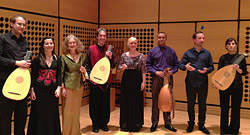


|
31 December 2013 In Praise of the Lute, and of Its Greatest English Master This year and last, leading up to the 450th anniversary of John Dowland's birth, have been busy and wonderful for me. I have had the luck to be asked to devise four duo recitals of his music, with Jacob Heringman, Jakob Lindberg, Paul O'Dette and Takashi Tsunoda; and to share courses on Dowland with three of those and with David Miller. (David also master-minded, last year at Dartington, a triumphant evening devoted to A Pilgrimes Solace of 1612. Considering Dowland's typically intricate and elusive textures, this appeared to be a very bold move, especially the decision to perform the songs in their printed order — but, taking advantage of the talent available on the Summer School faculty, David used five voices, treble and bass viols and lute, to cover almost all the possible scorings. Add to that the uniquely magical atmosphere and acoustics of the Great Hall — and I think few who were there will ever forget the experience.) For the straight duo recitals I had around 80 published songs to choose from, since there are one or two songs I adore but feel sound better sung by tenors, and a handful of others are not performable without a chorus or extra instrumental lines. I needed up to 16 songs each time (substantial solos from those marvellous players being a non-negotiable requirement). I have to admit one or two titles recurred — "I saw my lady weep" and "In darkness let me dwell" were in most evenings; but I never tire of these. Likewise, mostly following the sequence of the five publications made sense; but I can say in all honesty that each recital was a distinct and satisfying experience. There were some very special sequences. I especially love to hear the solo "Semper Dowland semper dolens" because I fancy I hear echoes of all my favourite songs there; also I am fond of the Fantasia that Paul O'Dette played, which quotes "Susanne un jour" — that came before "Time stands still"; and in Boston we ended that whole programme wordlessly, following "Thou mighty God" with the mighty "Farewell Fancy." Then there was the Fantasia Takashi Tsunoda added after "In darkness let me dwell" that seems to have plainsong in the middle. Perhaps the most amazing sequence of all was with Jakob Lindberg; "Lord de Lisle's Galliard"; "In darkness let me dwell"; "Semper Dowland semper dolens." In Japan as ever I found magnificent responses to Dowland both from audiences and from the young singers I coached in the middle weekend. There is such vigour these days in these voices — and their joy in the songs is palpable.
Early in November I joined Jacob Heringman in a slightly different slant on the song books; we took three young duos, a nice symmetry, the singers being two sopranos and a tenor, and the lutes one woman and two men; on the first night we gave a public class, coaching each duo in two songs of their choice, and then the next two nights we shared the stage, eight of us in a large semicircle, with no-one shifting position, but Dowland songs, or lute solos, or duets, coming from different places on stage. Each concert — one in Brighton, one in Nottingham — was a joy to us and very well-received by the audience. The singers were distinctive and engaging, the lutenists also highly individual but all very musical. When our three nights were over, all the performers asked "When can we do this again?" I felt thrilled and grateful. I cannot stress enough how special it is for good young singers to meet and work with lute players; it is a challenging yet liberating thing. I was so lucky to do this at the beginning of my career, and I've never tired or grown out of it. Regardless of what other exciting things I may be doing at other times (most recently, seven Messiah's [two in Sweden and five in Toronto] and an amazing week with the National Ballet of Canada), that distillation of emotion, beauty and uplift to be found in the songs of Dowland, and the best of the others, remains unique yet immediately welcoming and familiar — home territory! Emma |
||
